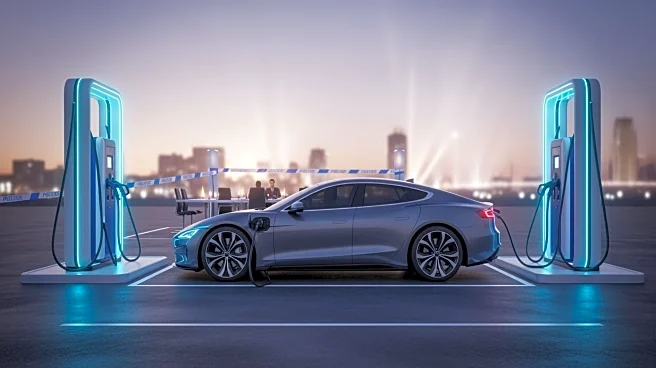What's Happening?
Nissan has recently unveiled the all-new 2026 Nissan LEAF, marking a significant milestone in electric vehicle (EV) technology. The new model showcases substantial improvements over the past 15 years,
including doubled power capacity, tripled battery capacity, and enhanced charging capabilities. The range of the LEAF has increased fourfold, while the cost has dropped by approximately 33%. These advancements reflect the broader trend of decreasing battery costs and improving battery technology, which have been pivotal in the evolution of EVs. The unveiling of the 2026 LEAF is seen as part of a quiet revolution in the automotive industry, driven by technological advancements and market shifts.
Why It's Important?
The introduction of the 2026 Nissan LEAF is significant for the U.S. automotive industry and consumers, as it represents the ongoing shift towards more affordable and efficient electric vehicles. As battery technology continues to improve and costs decrease, EVs are becoming more accessible to a wider audience, potentially accelerating the transition from traditional combustion engines to electric power. This shift is crucial for reducing carbon emissions and achieving sustainability goals. The advancements in the LEAF also highlight the competitive landscape in the EV market, where companies like Tesla are pushing boundaries with lower-cost models, prompting other manufacturers to innovate and improve their offerings.
What's Next?
Looking ahead, Nissan's forecast suggests that the LEAF could achieve a range of 500 miles with 375 kW fast charging at a cost of just $25,000 within the next 15 years. This projection underscores the potential for continued advancements in EV technology, which could further transform the automotive industry. As manufacturers strive to meet consumer demand for longer ranges and faster charging times, the competition in the EV market is likely to intensify. Stakeholders, including policymakers and industry leaders, will need to address infrastructure challenges, such as expanding charging networks, to support the growing number of EVs on the road.
Beyond the Headlines
The unveiling of the 2026 Nissan LEAF also raises broader questions about the future of transportation and energy consumption. As EVs become more prevalent, there will be increased demand for renewable energy sources to power these vehicles sustainably. This shift could drive significant changes in energy policy and investment in clean energy technologies. Additionally, the cultural perception of EVs is evolving, with more consumers recognizing their benefits in terms of environmental impact and long-term cost savings. These developments may influence consumer behavior and societal attitudes towards sustainable transportation.









